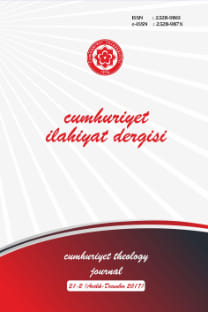Nostalgic Paradigm in Classical Sociology and Longing for Golden Age in Islamism
Klasik Sosyolojide Nostaljik Paradigma ve İslamcılıkta Asr-ı Saadet Özlemi
___
- Aktay, Yasin. “İslamcılık ve Bir Modern Melankoli: Eve Dön (eme)mek”. Milel ve Nihal 5, no. 3 (2008): 13-50.
- Aktay, Yasin. “Sunuş”, Modern Türkiye’de Siyasi Düşünce, İslamcılık. 6: 13-25. Istanbul: İletişim Publishing, 2011.
- Al-Azmeh, Aziz. İslamlar ve Moderniteler. Istanbul: İletişim Publishing, 2014.
- Berger, Peter L. and Thomas Luckmann. The Social Construction of Reality, England: Penguin Books. 1991.
- Berger, Peter L.. Dinin Sosyal Gerçekliği. Istanbul: İnsan Publishing, 1993.
- Bonnett, Alastair. The Geography of Nostalgia-Global Local Perspectives on Modernity and Loss-. New York: Routledge, 2016.
- Bora, Tanıl-Burak Onaran. Nostalji ve Muhafazakârlık “Mazi Cenneti” Modern Türkiye’de Siyasi Düşünce, Muhafazakârlık. 5: 234-238. Istanbul: İletişim Publishing, 2013.
- Boym, Stevlana. The Future of Nostalgia. New York: Basic Books, 2001.
- Davis, Fred. Yearning For Yesterday: A Sociology of Nostalgia. New York: The Free Press, 1979.
- Elliott, Anthony and Bryan S. Turner. “Debating “The Social”: Towards a Critique of Sociological Nostalgia”, Societies 2, no. 1 (2012): 14-26.
- Fritzsche, Peter. “How Nostalgia narrates Modernity”, In The Work of Memory, edited by. Peter Fritzsche, and Alon Confino, 62-85. Urbana and Chicago: University of Illinois Press, 2002.
- Fox, R.A.. The Tangled Chain: The Structure of Disorder in the Anatomy of Melancholy. Berkeley and Los Angeles: University of California Press, 1976.
- Holton, Robert J., and Bryan S. Turner. Talcott Parsons on Economy and Society. London and New York: Routledge, 1986.
- Kara, İsmail. Türkiye’de İslamcılık Düşüncesi. vols 2. Istanbul: Dergah Yayınları, 2014.
- Klibansky, Raymond, Erwin Panofsky, and Fritz Saxl. Saturn and Melancholy. Liechtenstein: Kraus Reprint, 1979.
- Latour, Bruno. We Have Never Been Modern. Cambridge: Harvard University Press, 1993.
- Megill, Allan. Aşırılığın Peygamberleri –Nietzsche, Heidegger, Foucault, Derrida-. Ankara: Science and Art Publishing, 1998.
- Nisbet, Robert. Sosyolojik Düşünce Geleneği, trans. Yusuf Kaplan. Istanbul: Paradigma Publishing, 2013.
- Skultans, Vieda. English Madness, İdeas on İnsanity 1580-1890. London: Routledge and Kegan Paul, 1979.
- Stauth, Georg, and Bryan S. Turner. Nietzsche’nin Dansı-Toplumsal Hayatta Hınç, Karşılıklılık ve Direniş-, trans. Mehmet Küçük. Ankara: Science and Art Publishing, 2005.
- Teber, Serol. Melankoli. Istanbul: Say Publishing, 2013.
- Tönnies, Ferdinand. Community and Association. London: Routledge and Kegan Paul, 1955.
- Turner, Bryan S.. Oryantalizm, Postmodernizm ve Globalizm, trans. İbrahim Kapaklıkaya. Istanbul: Anka Publishing, 2002.
- Turner, Bryan S.. “A note on Nostalgia”, Theory, Culture & Society 4 (1987): 147-156.
- Weber, Max. Sosyoloji Yazıları. trans. Taha Parla. Istanbul: İletişim Publishing, 2002.
- ISSN: 2528-9861
- Yayın Aralığı: 2
- Başlangıç: 1996
- Yayıncı: Cumhuriyet Üniversitesi İlahiyat Fakültesi
Nostalgic Paradigm in Classical Sociology and Longing for Golden Age in Islamism
Siyasetin Dine Etkisi Bağlamında Stalin’in Kilise Politikaları
Hastane Örneği Üzerinden Manevî Danışmanlık ve Rehberlik Hizmetlerine Genel Bir Bakış
Anadolu’da İlk Tapınak: Göbeklitepe
İlahiyat Alanı Makale Yazım Kılavuzu
Zotero ve Mendeley ile Atıf Sorunlarının Çözümü
The Influence of Islamic Philosophy on Bar Hebraeus (Abu’l-Faraj Ibn Al-Ibrī)
Edwin Cox ve Din Eğitimiyle İlgili Görüşleri
Muhammed b. Yûsuf es-Senûsî’nin Kelâm Anlayışında Mârifetullah-Akıl İlişkisi
